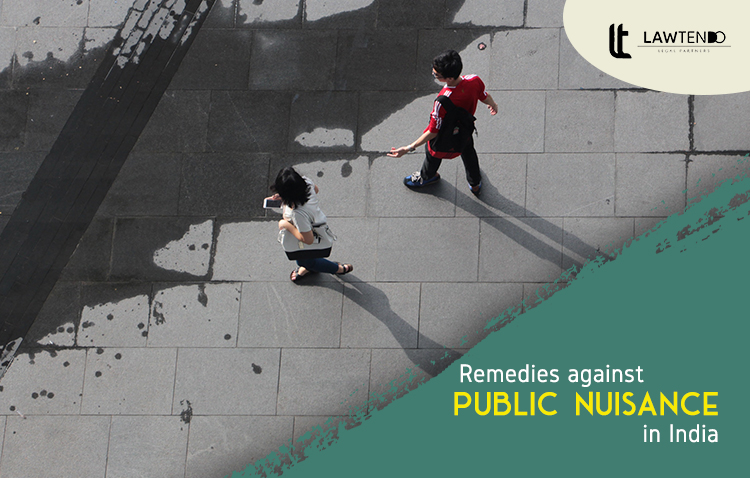Remedies against public nuisance in India

Date : 12 Mar, 2020
Post By Adv. Munish Malik
What is Public Nuisance? Section 268 of IPC defines Public Nuisance as any act done by a person which results in common injury, danger or annoyance to the public in general or the people residing in the near vicinity in particular. It also includes any injury, obstruction danger or annoyance caused to any person who had the occasion to use any public right.[1] Supreme Court has also defined Public Nuisance as any inconvenience materially interfering with the ordinary physical comfort of human existence.[2] Hon’ble S.C. also states that the decisive factor for public nuisance is the quantum of annoyance or discomfort affecting an individual.
Remedies under Civil Law Section 91 of Code of Civil Procedure, provides for remedies of public nuisance. It states that any wrongful act affecting or is likely to affect the public can be stopped either by taking an injunction against its continuance or any other remedy as deems fit according to the facts and circumstances of the case. A suit against any such act can either be instituted by the Advocate-General or two or more persons with permission from Court.[3] No special damage or injury is required to institute suit against public nuisance under civil law. Also, the extraordinary feature of civil remedy is that it does not provide bar on pursuing any other remedy against the action sought. Remedies under Criminal Law Criminal Law offers two kinds of remedies in India – (a) Indian Penal Code provides for a list of special circumstances which causes injury or damage to the public in general, and also provides for remedy in cases of common public nuisance, (b) Chapter X, Part B, of Code of Criminal Procedure, 1973, provides for procedural matter to be undertaken in cases of public nuisance. Chapter XIV of IPC – Offences affecting the Public Health, Safety, Convenience, Decency and Morals, provides for various special circumstances that cause interference with the ordinary physical discomfort of human beings, and also, under Section 290 and 291, it provides for punishment in cases of public nuisance. Section 290 proscribes a fine of upto Rs. 200 in cases of public nuisance.[4] Under Section 291, it provides for simple imprisonment upto a term of six months or fine or both, for cases when the nuisance is continued even though an injunction against it has been sought.[5] Code of Criminal Procedure, 1973 Chapter X of the Act provides a long list of Sections in regard to addressing cases of public nuisance. But most important of all is Section 133 – Conditional order for removal of the nuisance. The Section provides that a District Magistrate or Sub-Divisional Magistrate or any other Executive Magistrate on receiving the report from a police officer or any other information, after considering the evidence, can pass a conditional order. This Order can be passed in the following circumstances:- (a) When any unlawful obstruction or nuisance is required to be removed from a public place, river, path or channel which is under use lawfully by any public (b) When any trade, business, or storing of goods, results in injury to health and physical comfort of the community in general and therefore, such trade, business or storing of goods require prohibition or regulation (c) When any building, tree or tent is likely to fall and has chances of injuring people or places in its vicinity and thus, require its removal from the place (d) When any tank, well or excavation is situated in a manner that it is harmful for the safety of the public and hence requires proper fencing (e) When any animal poses danger is required either to be confined or disposed off. [6] The Order that is to be passed may provide for a fix duration of the time period and other instructions which result in removing of all the above mentioned obstructions or deal with them in such a way so that they no longer pose any danger to human life in general. [1] s 268, Indian Penal Code, 1860. [2] Vasant Manga Nikumba & Ors. v. Baburao Bhikanna Naidu & Ors. 1996 SCC (Cri) 27. [3] S 91, Code of Civil Procedure, 1908. [4] s 290, Indian Penal Code, 1860. [5] s 291, Indian Penal Code, 1860. [6] s 133, Code of Criminal Procedure, 1973. The author of this blog is Adv. Munish Malik having an experience of 5 years in handling civil matters from his experience he wants to share this beneficial information for the individuals having any issues with respect to civil matters.





